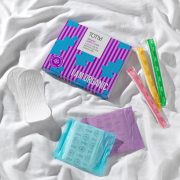We caught up with our consultant Gynaecologist, Ms Anne Henderson to discuss periods and organic period care! Here, Ms Henderson gives us the lowdown on why organic is kind to your body and the environment.
If you’re considering switching to organic or are wondering what all the fuss is about, then this post is a must-read. Discover the difference between mainstream and organic period care, with these insights from Ms Anne Henderson:
Be aware of mainstream product ingredients
“Many women are unaware that synthetic materials, such as rayon, makeup mainstream sanitary pads and tampons. These have been treated with pesticides, chlorine bleach and gelling agents to increase absorbency. They are also made of fragrance and other chemicals such as BPA (Bisphenol A). All of these additives have potential links to adverse effects. BPA is an industrial chemical. It is used in the manufacture of certain plastics and resins, including some sanitary protection. The chemical has been associated with health issues such as increased blood pressure. This is due to possible effects on the brain and behaviour. Whilst there is no proven link between the use of sanitary protection containing BPA and ill health, it is safest to avoid such products entirely.”
Natural softness you don’t get with synthetics
“Organic cotton products have a natural softness which is not present in synthetic fabric. It is extremely comfortable to wear in the delicate vaginal and vulval areas. Organic cotton is both highly absorbent and breathable and keeps the delicate skin drier and free from irritation than synthetic alternatives”.
More planet-friendly than conventional period care
“Certified organic cotton is grown and processed without the use of any damaging chemical agents, pesticides, fragrance or BPA. This not only means that people using these kinder and gentler products benefit, but there is also less damage to worldwide ecosystems. This can occur with the manufacture of synthetic products and conventional, non-organic cotton. Furthermore, organic tampons and pads are biodegradable.”
Organic products still cater for all flows
“Organic products come in a wide range. The range includes applicator tampons and non-applicator tampons of various absorbencies. Along with various standard pads and mini pads, so people can adapt the protection to their varying needs.”
No longer a niche
“Due to increased general awareness, brands such as TOTM are more generally available. They can be purchased in certain supermarkets and online. They are slowly becoming less of a niche product. Hopefully, they will continually be more readily available!”
What about TSS?
Tampons are internal menstrual products, which means there is always a risk of TSS with any tampon – organic or conventional. This is why all tampons carry the TSS warning and it’s essential to follow tampon safety guidelines (use lowest possible absorbency and change every 4-6 hours). Mainstream tampons which contain synthetic fibres can be linked to a higher risk of TSS. Dr Anne Henderson explains, “The increased risks with synthetic tampons, especially high absorbency ones, occur due to the particular environment created when rayon mixes with menstrual blood, especially with lighter flow. The key is thought to be micro-trauma to the vaginal wall and blood vessels during insertion and removal of such tampons, which can be more difficult when the vagina is dry, in comparison to when the tampon is soaked with heavy flow. This trauma then allows Staph and Strep bacteria naturally present in the vagina to penetrate into the bloodstream and cause systemic infection in susceptible individuals.”
Are you ready to make the switch to organic? Shop our range of organic cotton tampons, pads and liners. For more insights on the benefits of organic, catch up with Nina’s story where she shares her experience of using organic period care.





